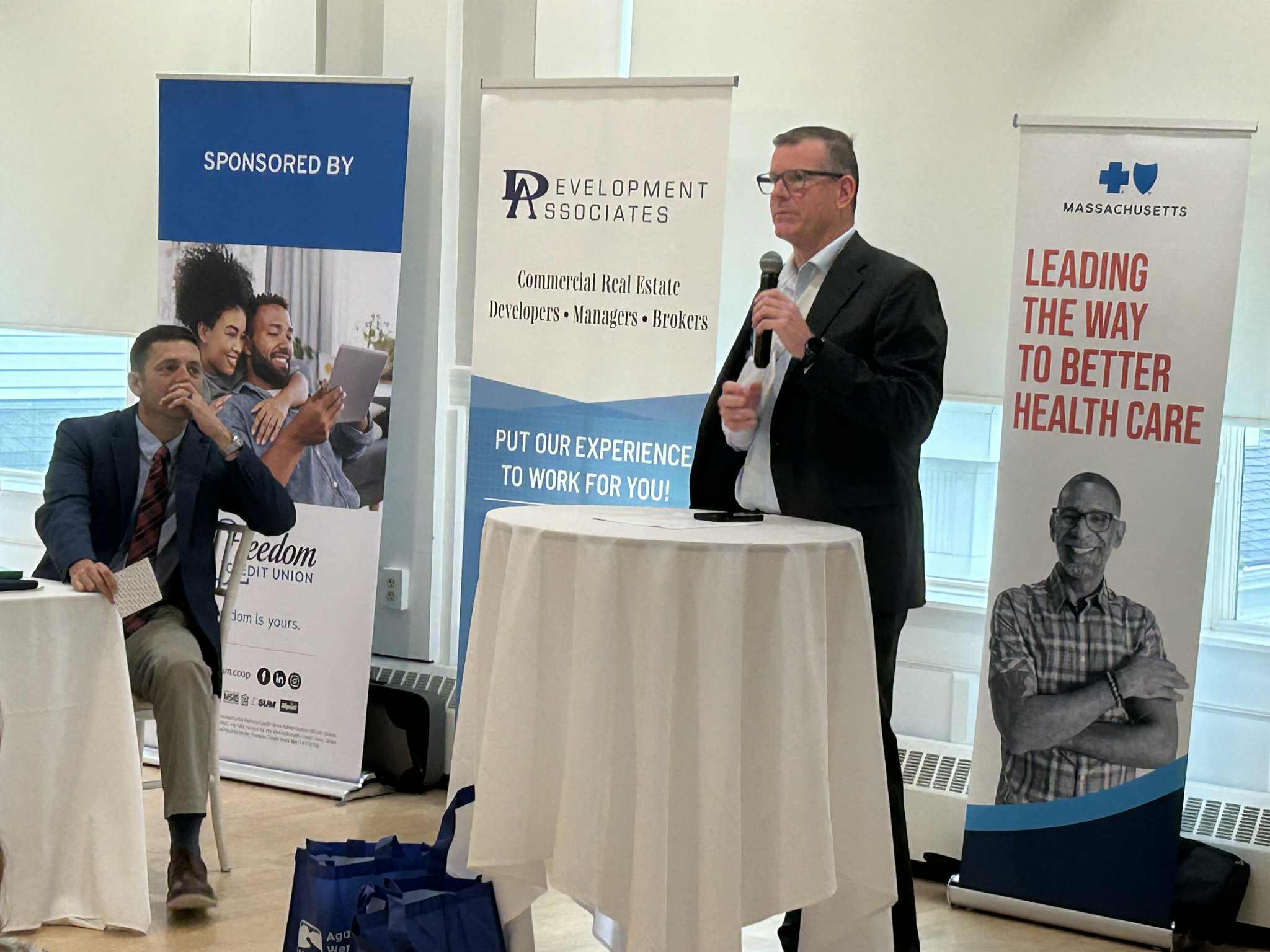State Sen. John Velis (left) and state Rep. Michael Finn (right) offer legislative updates at a Springfield Country Club breakfast.
Reminder Publishing photo by Ryan Feyre
WEST SPRINGFIELD — As chair of the House’s Joint Committee on Bonding, Capital Expenditures and State Assets, state Rep. Michael Finn is looking at ways to spur economic development.
At a legislative breakfast on Sept. 24 at the Springfield Country Club, the West Springfield Democrat said Hampden County has been steadily losing jobs the past decade.
To combat this pattern, his committee is about to work on the higher education bond bill that Gov. Maura Healey filed in January.
According to Finn, the bill intends to take a small percentage of the millionaire’s tax every year and then put it into a special application bond fund for capital improvements at the state’s public higher education institutions.
He said the bill would give the state $2 billion in buying power.
“That’s significant if you look at our region in particular with UMass Amherst, STCC, HCC, Westfield State,” Finn said. “When those projects start to come to fruition, we’re going to have arguably 10 to 15 years of employment for many of the trades and supply houses around here for all the materials that are going to go to that.”
“It’s a way to try to spur on some more economic development,” he continued.
Finn was joined by state Sen. John Velis at the September breakfast, which also featured other elected officials and West of the River Chamber of Commerce Board of Directors. The WRCC spearheaded the event so community stakeholders could hear legislative updates from the two delegates.
State Rep. Nick Boldyga, a Southwick Republican, was also supposed to be in attendance but had a prior commitment.
In his remarks to the crowd, Velis, a Westfield Democrat, said the state of Massachusetts is currently at an inflection point. He argued that everything the state is doing right now should be tied to affordability and cost of living, because a lot of people are leaving the commonwealth right now.
According to the United Van Lines National Movers Study from 2024, Massachusetts ranked fifth in “most moved from states,” and ranked seventh the year before that.
“There is real data that exists out there that tells us that folks are leaving Massachusetts,” Velis said. “And you can point to any number of reasons … we can talk about housing, we can talk about energy costs, we can talk about health care, we can talk about childcare. But there is this perfect storm of different factors that are making people who are here say, ‘I’m leaving.’”
Velis said not all hope is lost, alluding to the recent housing bond bill and economic development bill as recent milestones at the state level, but he argued that the pace inside the state legislature needs to pick up.
“Government needs to move faster,” Velis said. “We need to be more seamless. We need to be more efficient. And yes, in many instances, what that means, what invariably, interruptedly follows from that is that so much of this bureaucratic nonsense … needs to be pulled back.”
Both delegates mentioned the advent of AI and how it is impacting the Legislature. Finn said the legislative body needs to protect jobs moving forward as the state continues to reckon with the new technology.
“I’m more than happy to work with anyone here about protecting or creating new jobs for the region,” Finn said.
Relating to that notion, Finn also touched on the sales and use tax exemption for qualified data centers that was included in the state’s 2024 economic development bill. He shared that the exemption aims to bring private sector jobs into the region after the of jobs from regional powerhouses like Smith & Wesson, Lego and MassMutual.
A $4 billion data center campus is currently planned in Westfield thanks to these new tax incentives.
“Anything we can do to create and provide jobs or bring a new industry,” said Finn, a sponsor of the exemptions.
On his end, Velis said AI is here to stay, so the state needs to prepare incoming students for this ever-changing world. He mentioned how in the next five years, 50% of entry-level white-collar jobs could likely be gone because of the technology.
He shared that, while valuable in some instances, he is concerned that AI will dumb society down.
“We need to prepare ourselves for a world where we can quite literally wake up one day and the world has kind of moved on,” Velis said. “So, I spend a lot of time talking to students about, ‘hey, just be mindful of how this world is changing.’”
As the chair of the Joint Committee on Mental Health, Substance Use and Recovery, Velis also touched on his belief that cell phones should be banned from classrooms. In late July, the Massachusetts Senate officially passed legislation that makes schools cell phone free.
Titled “An Act to Promote Student Learning and Mental Health,” the bill requires all public school districts to adopt cell phone-free school policies by fall 2026. The state’s House of Representatives is now considering the legislation.
“We 100% need to ban phones in schools,” Velis said. “From a behavioral health, from an academic performance, from a social development standpoint.”


